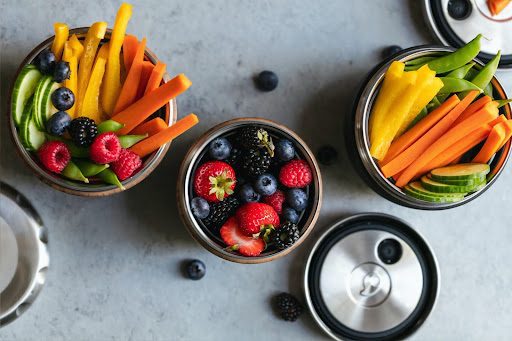Many health professionals recommend eating 6 small meals a day: breakfast, lunch, dinner – and snacks in between meals – to help upkeep metabolism and satisfy hunger cravings longer. However, snacking is the quickest way to ruin a healthy diet if done improperly.
Healthy snacking can be beneficial to maintaining a healthy mind, body, and soul. Aetna shares research about the way food affects mental health, suggesting the relationship between food and mood is developed by the “second brain” that connects the actual brain and the gastrointestinal tract. “Eating healthy food promotes the growth of “good” bacteria, which in turn positively affects neurotransmitter production, ” the article states. “A steady diet of junk food, on the other hand, can cause inflammation that hampers production.”
Dr. Gabriela Cora, a certified psychiatrist, asserts that when healthy diets become routine mood fluctuations are likely to decrease as well as increase the ability to focus.
The two main strategies to apply when trying to improve snacking habits are to feed the gut bacteria and minimize sugar intake. According to Healthline, “The bacteria in your gut, collectively called the gut microbiota, are incredibly important for overall health. A disruption in gut bacteria is linked to some chronic diseases, including obesity and a myriad of digestive problems.”
Feeding gut bacteria can look like eating yogurt, eating whole wheat chips with a sauerkraut dip, or even eating snacks high in fiber such as granola bars.
Minimizing sugar intake is important for overall health. “Sugar, in particular, is considered a major culprit of inflammation, plus it feeds “bad” bacteria in the GI tract,” Gomstyn wrote. Ironically, it can also cause a temporary spike in “feel good” neurotransmitters, like dopamine.” This spike, better known as a sugar rush, is normally followed by a crash in emotions.
Here are three ways to snack smarter in between meals:
- A few hours after breakfast a green smoothie is a refreshing way to start the morning. Green smoothies are made of fruits and vegetables full of antioxidants, which fight inflammation and contain Omega-3 fatty acids.
- Eating a generous serving of tasty nuts or seeds helps feed the savory cravings lingering after lunch. Healthline says, “ Some people avoid nuts because they are high in fat. However, nuts and seeds are incredibly nutritious.” Nuts and seeds contain many nutrients that are essential for the body such as protein, fiber, vitamin E, B6, and other minerals. Healthline also asserts that nuts can aid in weight loss, and reduce the risk of type 2 diabetes and heart disease.
- Healthy desserts after dinner are hard to come across but they do exist. The most common sweet that is beneficial to the body is dark chocolate. There are many scientific studies that show dark chocolate is a super food filled with antioxidants and has a variety of benefits such as improving blood sugar levels, aiding in weight loss, and helping support the bodily production of collagen for healthy-looking skin.





